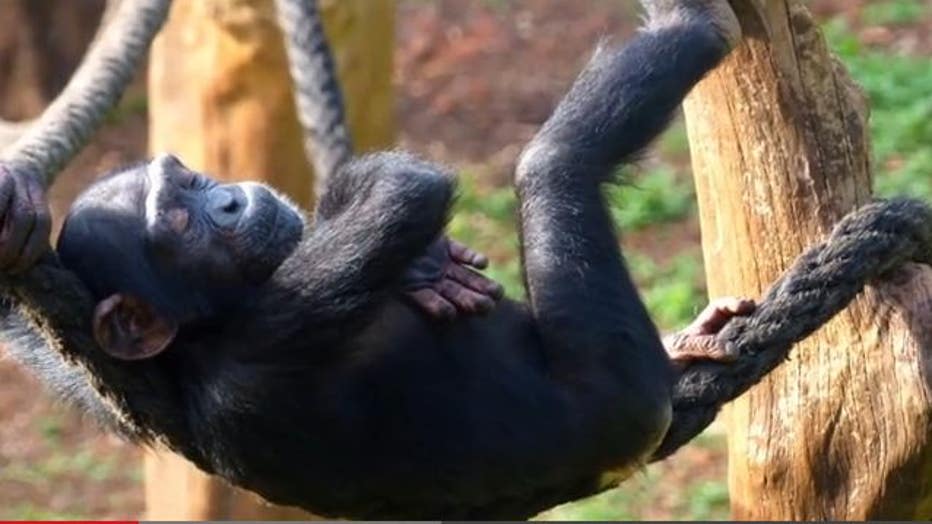Video shows chimpanzees find human yawns contagious
By Geoffrey Mohan, Los Angeles Times
Grown chimpanzees can't resist the power of a yawn, even if it comes from humans.
That's the result of a study involving orphaned chimpanzees rescued from Africa's illegal bush meat trade.
Elainie Madsen, an evolutionary psychologist from Sweden's Lund University, yawned and made other faces at the chimps at the Takugama Chimpanzee Sanctuary in Sierra Leone. She found that only the grown chimps appear to develop a contagion for yawning, just as humans do.
Very young chimps didn't imitate the yawns or control gestures -- gaping and nose wiping -- made by Madsen and the chimps' caretaker at the sanctuary. Video footage shows infant and juvenile chimps who seem oblivious to Madsen's yawns. But an older chimp readily yawns when Madsen or the caretaker yawn.
Madsen has done the same experiments with dogs, and found young pups were oblivious, while their elders show the same contagion to yawning that is common among humans.
“It’s possible that it’s a developmental pattern across the species,” Madsen said.
The chimp results, published this week in the online journal PLOS One, strengthen the theory that primates exhibit at least an unconscious form of empathy.
“It’s the kind of empathy where, instead of thinking your way into how someone else might be experiencing the world or feeling, you just feel it," Madsen said. "Like when someone cuts their finger you feel sick in your stomach.”
While humans exhibit this "affective" empathy and all kinds of unconscious mimicry, they appear to be unique among animals in their ability to consciously put themselves into another individual's shoes. Cognitive empathy requires a "theory of mind" -- the notion that others experience the world differently -- that primates have not demonstrated in experiments. Humans only develop the trait around age four, studies have repeatedly shown.
Madsen was curious about social elements of yawning. Adult chimpanzees tended to yawn more readily in response to members of their own group, a study in 2011 found. So, Madsen expected that facial familiarity would affect the number of contagious yawns she observed among the rescued Sierra Leone chimps.“We’re more likely to empathize with those we’re familiar with, so we really expected the adoptive mother of the chimps would be able to provoke more contagious yawning, with the younger chimps in particular,” she said. “But there was no such thing, which is puzzling.”
Madsen theorized that chimps may respond differently to humans than they would to other chimps. Previous yawn studies only examined contagion from other adult chimps, she noted. The traumatized Sierra Leone chimpanzees, many of which have witnessed the deaths of family or group members, also could associate the human faces at the sanctuary with affection, fun and help, she said.
At a cellular level, "monkey see, monkey do" may be hard-wired. Mirror neurons, found in primates and some birds, are copycats, firing off in response to outside stimuli.A part of the human brain is packed with such neurons. But brain imaging studies have shown that this repository, known as the Broca Area, didn't activate during contagious yawning. Areas associated with social skills and processes that require self-referential processing, however, did show heightened activity.
So, is a yawn some way for social groups to get on the same page? And why would that matter so much that it would be conserved over eons of evolution? The trait is shared among baboons and bonobos, and even the domestic dog does it.
Studies suggest that yawning helps regulate brain temperature, including mild site-specific increases associated with sleepiness. Patients with brain disorders associated with poor temperature regulation also display atypical yawning patterns, studies have shown.
For social animals, then, a collective yawn could be nature's way of making sure everyone's brain is at the same level of alertness. A yawn can help you shake off drowsiness in preparation for a threat or task, and it can be a prelude to settling down, Madsen noted.
When Madsen yawned for dogs, they tended to drift off to slumber. And she wasn't immune from the so-called behavior transfer.“I remember coding these videos,” Madsen said. “It would make me extremely sleepy."


